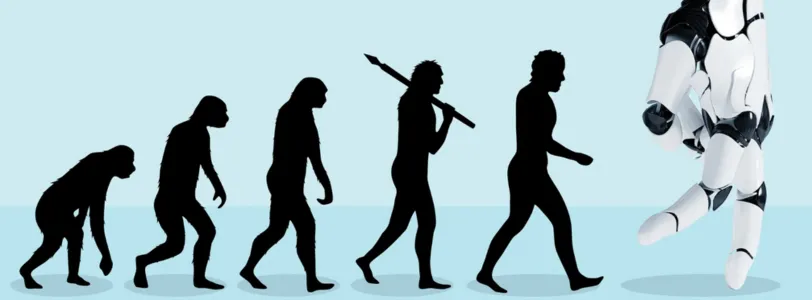Artificial Intelligence (AI) conjures up different emotions for different people. Some view it as the end of time with murmurous of Skynet (a Terminator reference for anyone who is confused, Skynet was the start of the end for human civilization in the movies). While others view it as a transformative force similar to the industrial revolution or the creation of the personal computer and the internet. Regardless of which side of the fence you sit on, one undeniable fact is that AI is currently reshaping and will continue to change the workforce. The industrial revolution shifted most of the workforce from farms into factories; the advancement of technology shifted the workforce from factories to offices; now the question is how will AI shift the workforce of tomorrow? Will offices exist in a different capacity? Will jobs evolve so we work in labs and data centers to service AI servers? Will it allow us to finally work from the beach without compromising productivity? Or will it render many of us obsolete, therefore necessitating conversations for universal basic income?
To start with, we must truly understand what AI is. Dr. Ida Arlene Joiner, author of Emerging Library Technologies describes AI as “The ability of a digital computer or computer-controlled robot to perform tasks commonly associated with intelligent beings such as humans”. Others use the term AI as an umbrella concept to encompass all advancements in computing, systems, and technology in which computer programs can perform tasks or solve problems. Additionally, these problems usually require the kind of reason we associate with human intelligence, even learning from past processes. There is one thing we can agree on: AI mirrors our ability to solve puzzles. However, surely that makes sense, doesn’t it? Since it has been designed, created, and modified by us, it has become an extension of ourselves.
AI in its current form offers significant benefits to businesses and employees. Perhaps the most well-known example of this is Open AI’s Chat GPT. It is a language AI which operates akin to a chatbot but possesses an IQ of 155. For comparison, the average human has an IQ of 85-155 while Einstein’s was 160. However, AI in its current form has a very deep understanding of a particular topic, yet it lacks the broader intelligence we possess.
Siri is another example of AI we use on a regular basis; she is incredibly helpful and can make our lives far easier. However, she is unable to read over your work and check for spelling errors, yet she possesses the tools to do so. Reinforcing the notion again that AIs are very good at one thing but limited in their broader abilities. Alternatively, ask Chat GPT to play your favorite music, or set a reminder, it has no idea and will inform you it is a language AI and that playing your favorite music is not within its capabilities.
Naturally, all of this leads to the ultimate question “What does this mean for my job in the future”, and you wouldn’t be alone in this thought. On the 22nd of March, A letter was published publicly containing over 1800 signatures calling for a 6-month pause on all AI technology that is smarter than Chat GPT 4. Moreover, this letter contained signatures from esteemed technology developers. Signatures included Elon Musk, Steve Wozniak (Apple co-founder), and Gary Marcus (cognitive scientist). Additionally, it was also signed by software engineers from companies such as Amazon, DeepMind, Google, Meta, and Microsoft. The purpose of this pause is to allow developers time to agree on safety measures and allow them time to focus on how they will move forward to ensure AI aligns with our values. If you’re thinking “But how can these companies decide what our values are?” You’re not alone, in fact, Google’s CEO – Sundar Pichai agrees. In an interview with CBS, he stated that the advancement of AI needs to include social scientists, ethicists, and philosophers.
One thing is for certain, we will see the end of human workers in certain industries. Grocery stores are popping up around the world with no staff… just set up an account, grab what you want and walk out. It will just take the money from your account, thus removing the need for shopkeepers. However, it is difficult to avoid the notion we brought this on ourselves. The popularity of self-service checkouts, the increased use of home delivery services, and the impending death of the high street as more of us gravitate towards shopping online. Based on this, isn’t AI and automated machines the next step? How could we expect stores to keep paying staff, utility bills, and rental fees when we use self-operating checkouts and their online stores? Additionally, the rise of self-driving vehicles will cause a huge landscape shift in the workforce, with truck drivers and taxi drivers potentially finding their job obsolete.
However, we are starting to digress into the doom and gloom of AI taking all our jobs, and yes it will take jobs, but it will also create new jobs that currently don’t exist. Today do you hear of anyone working as a switchboard operator, knocker-uppers (human alarm clocks), carriage makers, signalmen, linotype operators, aircraft listeners, lectors, and scribers? No! Yet these were once important jobs that have fallen by the wayside with the advancement of technology. Yet not all the people working in these roles became homeless, the economy didn’t collapse, and thankfully we avoided the end of mankind. What did happen was the workforce was upskilled, and because of our upskilling, society became smarter, and the cycle continues. Replacing the knocker-upper we have electrical engineers creating alarm clocks, instead of carriage makers, we have car manufacturers, which also created another industry, car mechanics. Is there a reason to believe this time will be any different? Based on history, no. There is only reason to believe as a society, we will upskill, become a smarter species, and carry on with our evolution.
So, could AI be the start of Skynet? We propose a different thought process. If AI becomes so intelligent but has evolved from our way of thinking with our values intrinsically embedded in its coding, would it not help us create world peace and understand our differences from people of other cultures and backgrounds? Instead of destroying us, by unleashing the world’s nuclear weapons upon us, would it be more likely to refuse the launch of a nuclear weapon and completely erase the fear of nuclear warfare? Taking it a step further, could it not disappear altogether? We are limited to the biological world; AI has the entire digital world and could progress so far it leaves us behind. There is even the possibility of leaving Earth and seeking new opportunities elsewhere on other planets. Again, it was made by us, and we have been attempting to explore space from the moment we saw stars, so why wouldn’t AI? We’re not saying this will happen, but it is more likely than the alternative… Skynet.
If you’ve read this far, you’re probably starting to wonder “Isn’t Compass a certification, business? What does AI have to do with us”? Well with the meteoric rise of AI over the past few years ISO has responded by developing the ISO/IEC 23053:2022 (Framework for Artificial Intelligence (AI) Systems Using Machine Learning (ML)). ISO has many certifications such as ISO 9001:2015 and ISO 27001:2013 which help companies effectively protect and utilise the information of both their stakeholders and themselves. Therefore, to remain compliant with standards companies need to monitor how they interact with cloud-based AI’s. Everything you ask AIs such as Chat GPT is recorded and stored, therefore you could be risking the custody of sensitive information. ISO 23053:2022 has been designed for companies of all sizes that use generic AI models.
Wrapping this all up, we believe the future with AI is one of excitement and prosperity. We believe working alongside a greater intelligence than our own will accelerate our advancement and propel us toward becoming a more advanced civilization with greater opportunities for world peace. This is a world we want to be a part of and we wait with great anticipation for it to arrive.





